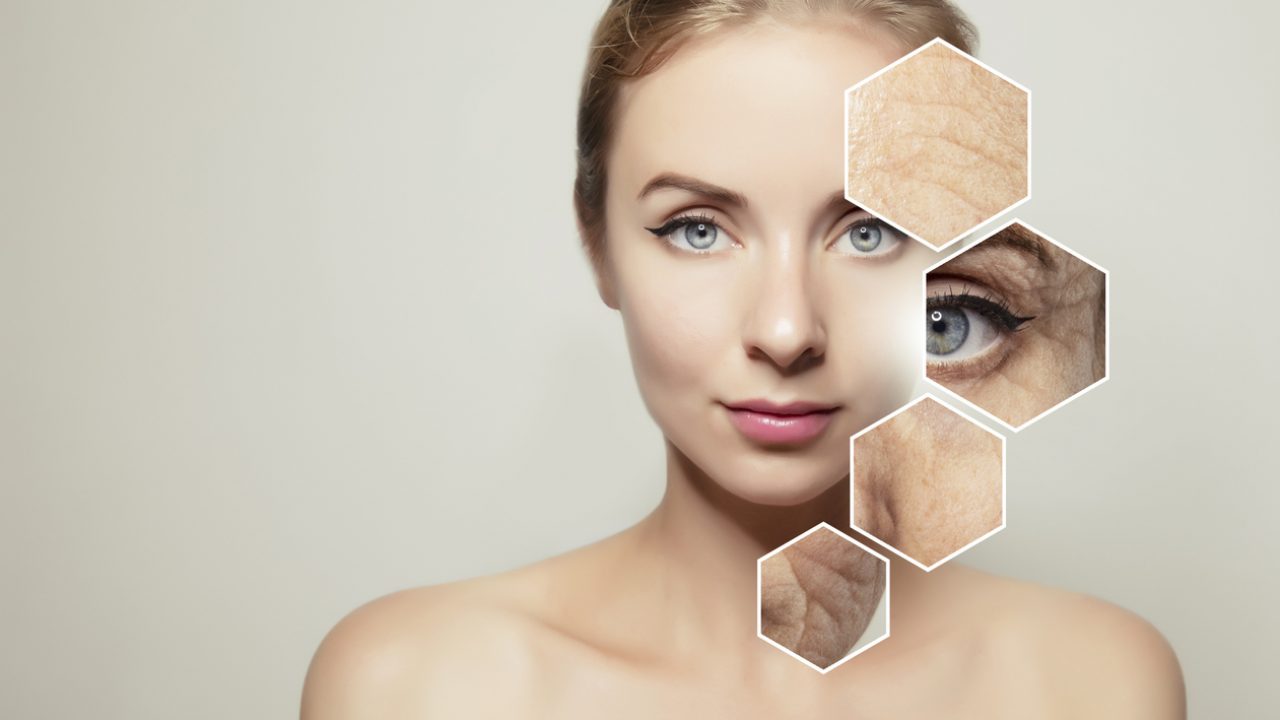
As we age, our skin starts to sag, becomes less elastic and wrinkles begin to appear. In women, this process often starts to happen around the menopause but many of us will be already seeing the signs long before this.
To understand more about why our skin sags as we get older, and what we can do to prevent wrinkles from appearing in the first place, we spoke to experts Dr Rekha Tailor, founder of the health + aesthetics clinic in Surrey, and Dhruvin Patel, optometrist and founder of Ocushield.
Collagen and elastin are proteins which work as a supporting structure in skin. Collagen binds it together and makes it strong, while elastin makes it stretchy and bounce back. Collagen and elastin are both produced by fibroblast cells.
“As we age, our collagen production slows down and so our skin begins to lose elastin and collagen,” skin expert and former GP, Dr Rekha Tailor told mamabella. “This causes the skin to hang loosely and create what we know as wrinkles and sagging skin.”
READ NEXT: Best anti-ageing creams
Tailor continues that as we get older, the area where the skin’s outer layer – the epidermis – and the layer underneath – the dermis – meet also flattens. This makes the skin become more transparent and fragile and prone to damage, such as age spots. “Premature ageing can be exacerbated by a number of factors including lifestyle, pollution and sun exposure” she says.
One such lifestyle impact is the overuse of technology. You may know that blue light disrupts the body’s natural clock and can disrupt sleeping patterns – which, in itself, can lead to skin looking old before its time – but did you know it also causes ageing, or at least adds to the causes?
 www.godandman.com
www.godandman.com “Living in the digital age means most of us use computer screens for work, and smartphones for messaging and video calls” said Dhruvin Patel, optometrist and founder of Ocushield, which makes anti-blue light glasses. The blue light emitted from LED digital device screens poses a risk to our skin, because, according to Patel, “blue light carries short-wavelength visible light, which can penetrate deep into our skin, unlike UVA and UVB light.”
READ NEXT: What is SPF and why is it so important?
In particular, blue light can reduce the firmness of the skin and increase the visible lines because the blue light reaches the dermis layer, where our collagen and elastin are found.
“To limit early skin ageing due to blue light, I would recommend decreasing the brightness of your device and moving to further away,” Patel explains. “This will reduce the intensity and proximity that blue light has on your skin”. He also recommends a blue light screen protector for your screen.
One of the best ways to prevent wrinkles is to protect your skin from the sun, continued Tailor. “Exposure to the sun can cause premature ageing and wrinkles so by wearing a broad-spectrum SPF at all times, even when it doesn’t seem sunny outside, you’re providing your skin with the best barrier against the damage caused by the sun’s harmful rays” she says.
You can read more about the impact sun exposure has on your skin in our What is SPF? guide.
So what else can we do to prevent wrinkles? “It’s important to stay hydrated and eat a balanced diet rich in fatty fish and healthy fats such as avocados and nuts,” said Tailor. This will help your body to continue to produce the proteins needed for healthy skin. “Avoiding lifestyle factors which can cause premature ageing such as smoking and excessive alcohol consumption also helps.”
You can read more about the impact alcohol has on your skin in our Why is my skin breaking out? guide.
Then there are anti-ageing products available to buy. “When it comes to your skincare routine, using a retinoid, which is derived from Vitamin A, is one of the best anti-ageing cream ingredients,” added Tailor.
Retinoids, or retinol, help to increase collagen and elastin production by stimulating the fibroblast cells.
This helps plump the skin and also encourages skin regeneration, which in turn improves the appearance and texture of skin. You can read more about the benefits of Vitamin A in our guide to The truth about the acids in your skincare.
You can read more about anti-wrinkle products in our best anti-ageing and best eye cream lists.
The graphic below reveals more about how anti-ageing products work.
“I would suggest including medical-grade skincare products such as ZO Skin Health” Tailor concluded. In the UK, ZO Health is sold by approved stockists only, use this map to find your nearest one.

Abigail is a leading science journalist writing about space, sustainability, technology and culture. She is author of The Art of Urban Astronomy, a must-have guide to the night sky that guides you through the seasons and learn about the brightest stars and constellations, the myths and legends of astronomy and how to identify star clusters and galaxies.
